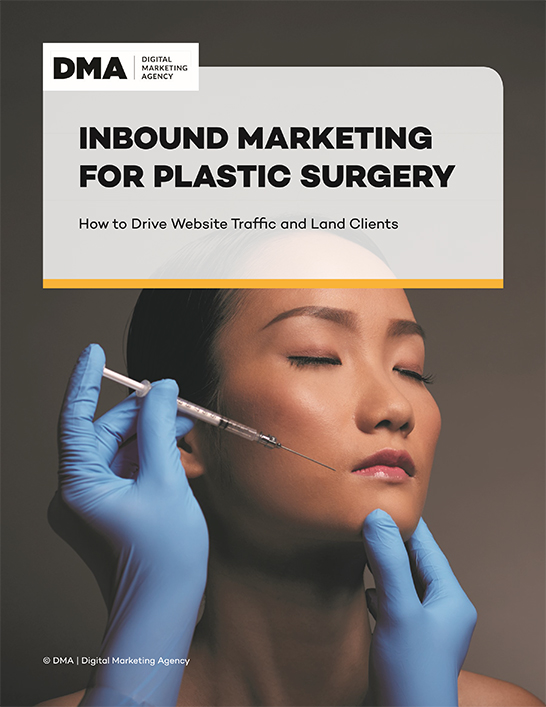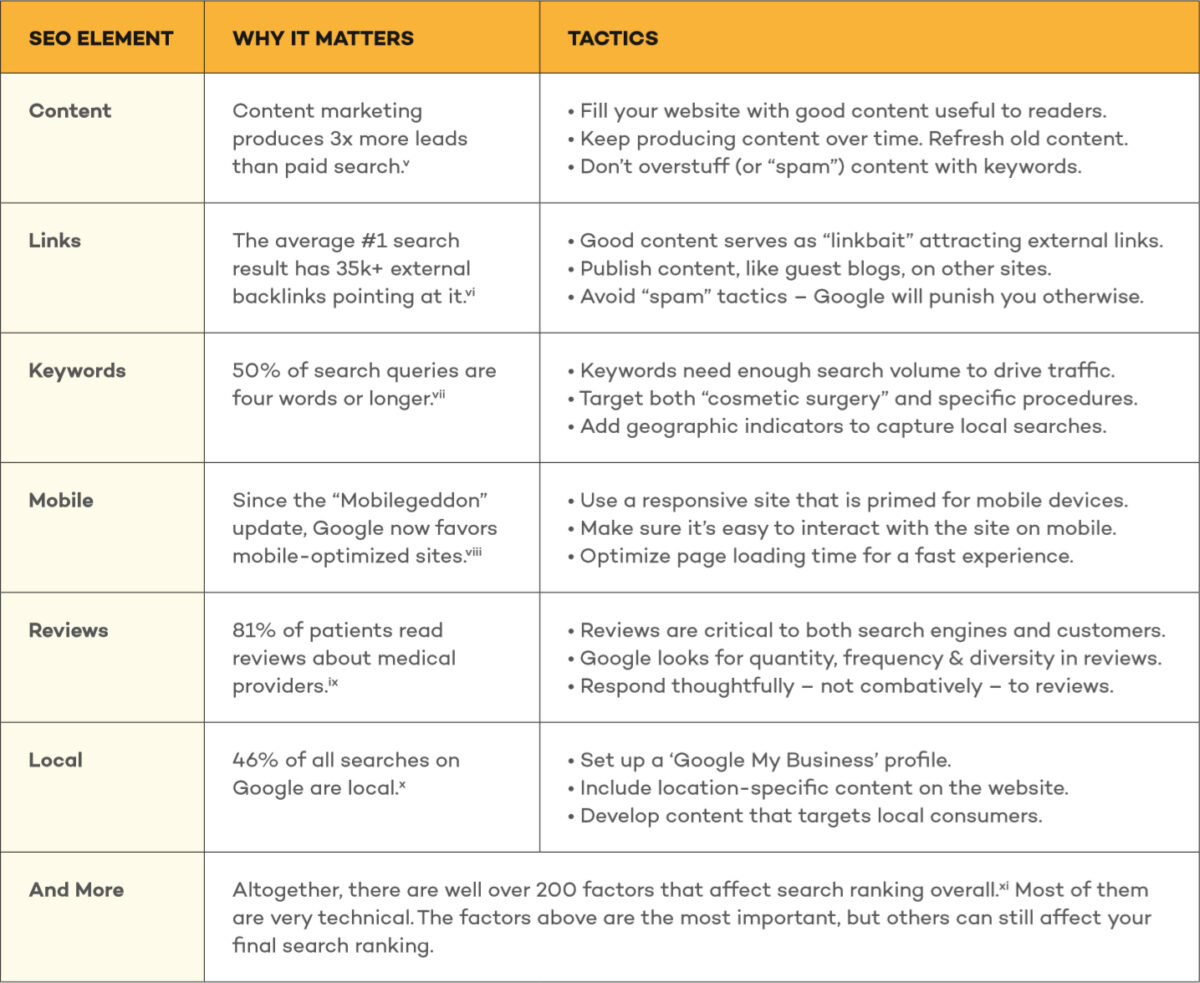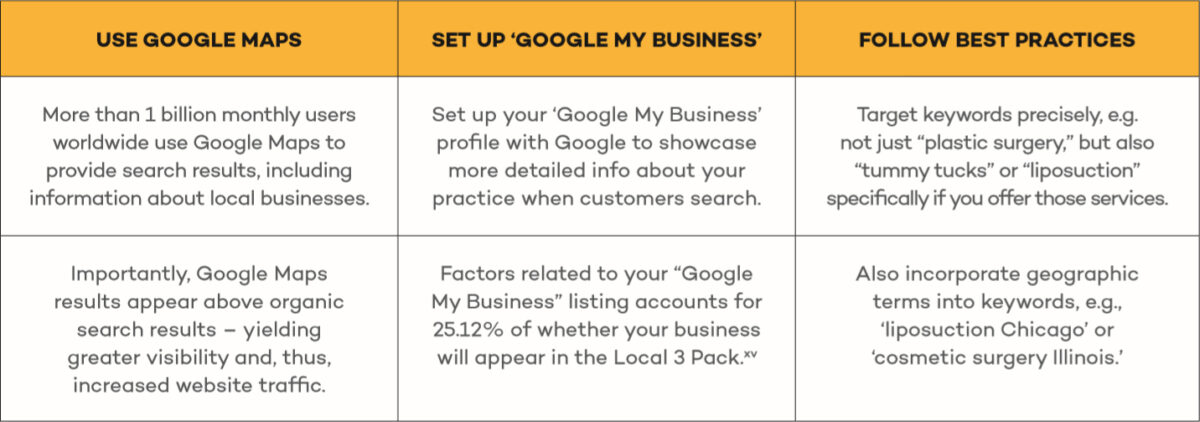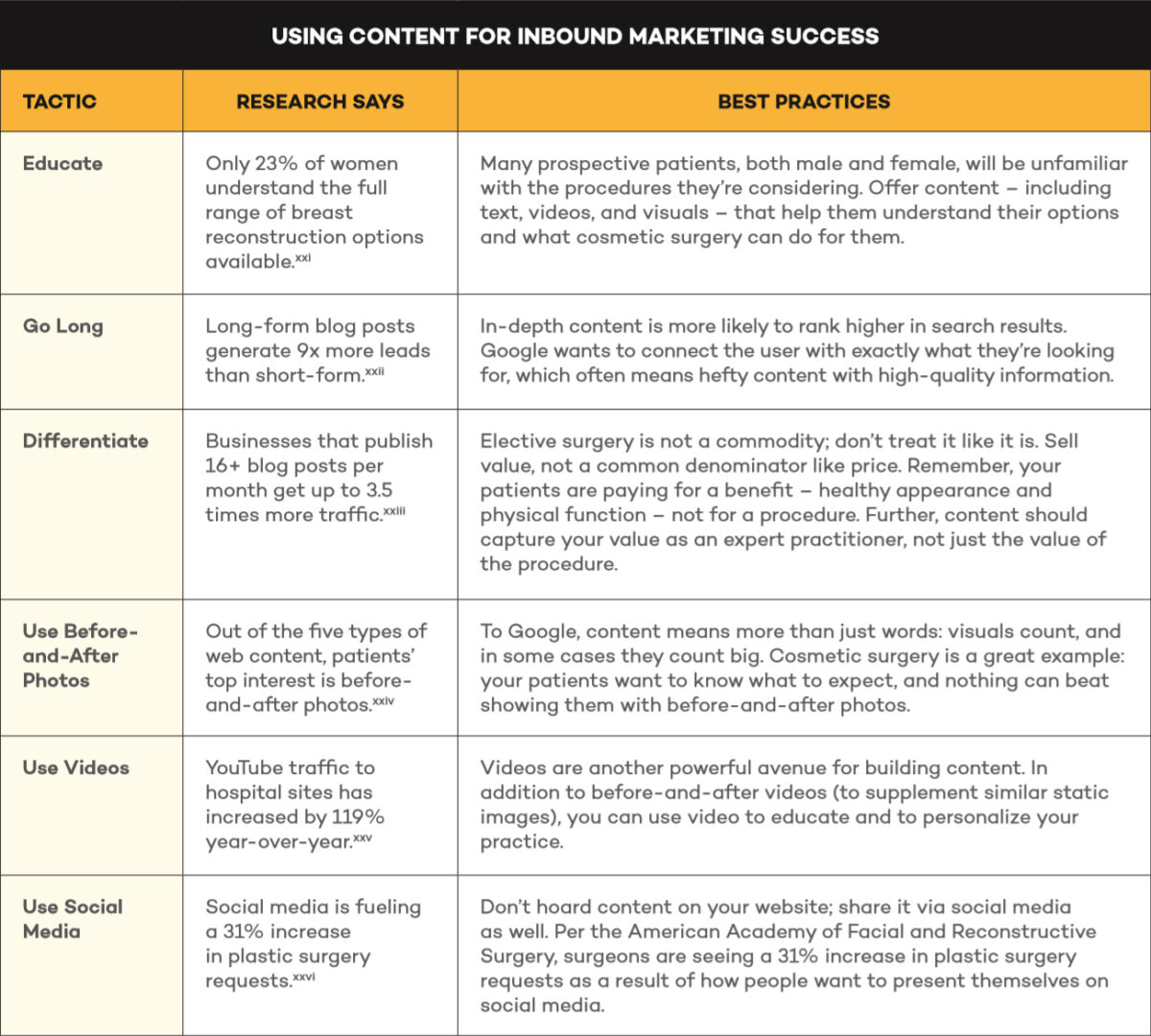SEO
Free SEO Analysis
SEO Services
Content Marketing Services
Local SEO
Link Building Services
Specialized SEO Services
PPC
REPUTATION MANAGEMENT
Free Reputation Management Analysis
Reputation Management Services
Review Management Services
Specialized Reputation Management Services
CEO Reputation Management
Brand Enhancement
Business and Directory Listings
Comprehensive Reputation Management Audit
SOCIAL MEDIA
Free Social Media Analysis
Specialized Social Services
WEB DEVELOPMENT
Free Website Analysis
Web Design Services
Mobile Development Services
Website Maintenance Services
Specialized Development Services
MARKETING AUTOMATION
Free Marketing Automation Analysis
Specialized Marketing Automation Services
Comprehensive Marketing Automation
INDUSTRIES
ABOUT DMA
WHITEPAPER
Inbound Marketing for Plastic Surgery
17th July 2022
Executive Summary
Getting the basics of SEO right is the critical first step in any inbound marketing program.
Successful SEO efforts can directly benefit online appointment bookings
With a strong message and educational materials available, your practice will be equipped to thrive.

In today’s world, the healthiest marketing strategy for plastic surgeons requires a robust system that can bring patients to you.
The plastic surgery market is growing fast, reaching a market value of $16 billion in 2017, according to market analysts at IBISWorld.[i] That reflects a very healthy growth rate of 6.6%. The American Society of Plastic Surgeons reports that 17.5 million cosmetic procedures were completed that year.[ii] Further, this sector is likely to continue expanding, thanks to factors like the following:
Medical and technical advances that make procedures more effective;
An increase in the incidence of cosmetic conditions like acne;
An aging population concerned age-related conditions like wrinkles;
A rising number of men seeking cosmetic procedures;
Greater social and professional pressures to maintain youthful appearance and physical wellness;
and
Increasing consumer awareness – and acceptance – of cosmetic procedures.
Rapid growth, with more patients and more procedures seeking elective surgeries, creates tremendous opportunities. But at the same time new challenges are also emerging: more and more prospective patients are turning online to find, research, and choose medical providers. After all, nine out of ten consumers already turn to a search engine when looking to solve healthcare-related queries.[iii] When they do so, will it be your practice that they find?
With inbound marketing, the answer can be an emphatic yes. Inbound marketing is the process of creating a web presence that exerts its own gravitational force, attracting prospective patients to you naturally. The result is a healthy flow of emails, calls, and booked consultations. It’s also a fantastic way to stand out from other providers in the arena, because historically healthcare practitioners have focused on more traditional forms of marketing, like cultivating referrals.
Best of all, once the system is set up, inbound marketing is a snap. Plastic surgeons just need to ensure that all the pieces are in place to catch those consumers and draw them to your site.
But what are the primary elements of a powerful inbound marketing program in this space?
That’s the question this paper will address.
Search Engine Optimization for Cosmetic & Elective Surgery: Get Eyes on Your Website
Today, most prospective patients turn to the internet as their first medical resource: as mentioned, fully 89% of consumers turn to a search engine when looking to solve their healthcare queries. [iv] That’s where they research health options and locate area providers. It’s also how they evaluate the cosmetic surgeons to whom they’ll be entrusting their appearance and well-being.
But which websites will they encounter when they go online and do a search? Will it be yours? It’s pivotal for any surgical practice to be discoverable online – even more so for elective procedures where patients are more likely to seek out information and options on their own, in addition to (or absent of) referrals from their primary provider.
Getting the basics of SEO right is the critical first step in any inbound marketing program. But it’s also challenging – plastic surgery is an incredibly competitive field online and making it onto the first page of results demands that you get every major element of SEO – like those described in the table below – just right.

Successful SEO efforts can directly benefit online appointment bookings.[xii]
Local SEO: Reach the Exact Population Most Likely to Book a Consultation
The SEO elements described above are critical, but they're also only the start. It's not enough to show up for online for general searches, because most people won’t be able or willing to travel across the country for an elective procedure. Instead, your SEO efforts need to show up for locals specifically.
Consider that “near me” searches for health-related services have doubled since 2015.[xiii] Google has responded by incorporating location into its algorithm for search ranking. Today, your office’s proximity to the location of a web searcher’s search is the top factor in ranking local search.[xiv]
Part of the reason local search is so critical is that the top 3 local listings – called the “Local 3 Pack” in Google search results – appear above the primary, organic search results. In other words, searchers see local listings before they get to the regular search results, and as a result, those links can capture the lion’s share of traffic. It’s prime real estate, and you want to optimize the chances of your practice appearing here.

Manage Online Reviews: Cultivate Trust
Even if you don’t care about using search engines to reach new patients, you need to be aware that new patients will be using search engines to research you. Additionally, review sites often double as directory listings, so they may be where prospective patients find you in the first place. If that’s not enough to convince you to take reviews seriously, they also heavily influence whether your practice shows up in the Local 3 Pack.
You can’t control the reviews that patients write about you, but you can manage the process to encourage more good reviews and mitigate the impact of bad reviews. As Andrei Zimiles, CEO of medical provider directory Doctor.com says:
"The fact that 81% of patients will read reviews about a provider, even after they've been referred, indicates that we've entered a truly consumerist era of healthcare. Patients depend on online sources of information [and] are using all of the digital tools available to inform themselves and make healthcare decisions."[xvi]
Research shows that it only takes one to six online reviews for 68% of potential patients to form an opinion about your practice.[xvii] Bear in mind, this may be even truer in the medical field than in general, given that almost 72% of patients use online reviews as their first step in finding a new doctor.[xviii] To that end, monitor more than just Google reviews: medical-specific review sites are critical too because they often show up in search results. For example, Healthgrades, RateMDs, Wellness.com, and Vitals provide reviews, ratings, and information on all kinds of practitioners. RealPatient Ratings and RealSelf focus specifically on plastic surgery.
Content Marketing: Generate Credibility and Leads Simultaneously
Content marketing is the cornerstone of any inbound marketing program. Indeed, it does double-duty for cosmetic surgeons. First, it’s a key component of any SEO strategy, serving as the engine of any lead generation effort. You can generate three times the number of leads using a successful content marketing strategy, and it costs 62% less than other marketing options.[xix] Even better, this is an area where plastic surgeons can easily outpace competitors in the same space: on average, healthcare marketers spend only 23% of their total marketing budget on content marketing activities, compared to 31% for all marketers.[xx] Second, it’s critical to establishing expertise and credibility. Your prospective patients need to know that you have the expertise and experience to generate the outcome they desire. Good content cultivates that credibility.

Conclusion
In a world in which more and more people turn online to find healthcare providers, plastic surgeons have excellent opportunities to reach prospective patients and build their practice.
Further, by building an inbound marketing program built on compelling content and a strong SEO effort, they can simply wait for patients to come to them, without having to rely on outreach or other expensive, unreliable marketing initiatives. But for that to happen, surgeons must optimize their online presence and digital marketing efforts. If you can do so, your practice will be able to reach prospective patients online at the precise points when and where they are seeking information about elective procedures. With a strong message and educational materials available, your practice will be equipped to thrive.
The only question is, will you take the steps needed to ensure your next patients will be able to find you online?
[i] https://www.ibisworld.com/industry-trends/specialized-market-research-reports/life-sciences/health-practitioners/plastic-surgeons.html
[ii] https://www.plasticsurgery.org/documents/News/Statistics/2017/plastic-surgery-statistics-full-report-2017.pdf
[iii] https://www.thinkwithgoogle.com/intl/en-aunz/marketing-resources/micro-moments/micro-moments-guide-how-australians-find-and-choose-health-services/
[iv] https://www.thinkwithgoogle.com/intl/en-aunz/marketing-resources/micro-moments/micro-moments-guide-how-australians-find-and-choose-health-services/
[v] https://www.oracle.com/webfolder/mediaeloqua/documents/Content+Marketing+Kapost+Eloqua+ebook.pdf
[vi] https://backlinko.com/search-engine-ranking
[vii] https://backlinko.com/search-engine-ranking
[viii] https://en.wikipedia.org/wiki/Mobilegeddon
[ix] https://www.doctor.com/cxtrends2018
[x] http://www.go-globe.hk/blog/local-seo/
[xi] https://backlinko.com/google-ranking-factors
[xii] https://www.rocketclicks.com/client-education/5-stats-that-prove-youre-falling-behind-by-ignoring-seo/
[xiii] https://www.thinkwithgoogle.com/data-gallery/detail/near-me-searches-health-related-services/
[xiv] https://moz.com/local-search-ranking-factors/
[xv] https://moz.com/local-search-ranking-factors
[xvi] https://www.prnewswire.com/news-releases/doctorcom-survey-reveals-that-nearly-2-out-of-3-patients-will-choose-a-provider-because-of-a-strong-online-presence-300649353.html
[xvii] https://intrepyhealthc.wpengine.com/patient-reviews-local-seo/
[xviii] https://www.softwareadvice.com/resources/how-patients-use-online-reviews/
[xix] https://www.demandmetric.com/content/infographic-content-marketing
[xx] http://contentmarketinginstitute.com/2012/11/health-care-content-marketing-lags-two-years-behind/
[xxi] https://www.plasticsurgery.org/news/blog/new-plastic-surgery-statistics-and-breast-reconstruction-trends
[xxii] http://www.curata.com/resources/ebooks/content-marketing-tactics-technology-planner
[xxiii] http://blog.hubspot.com/marketing/blogging-frequency-benchmarks
[xxiv] https://www.ncbi.nlm.nih.gov/pubmed/29068943
[xxv] https://www.thinkwithgoogle.com/advertising-channels/search/the-digital-journey-to-wellness-hospital-selection/
[xxvi] http://healthland.time.com/2013/05/15/social-media-and-plastic-surgery/
Our Sales team
We are available for you every time
